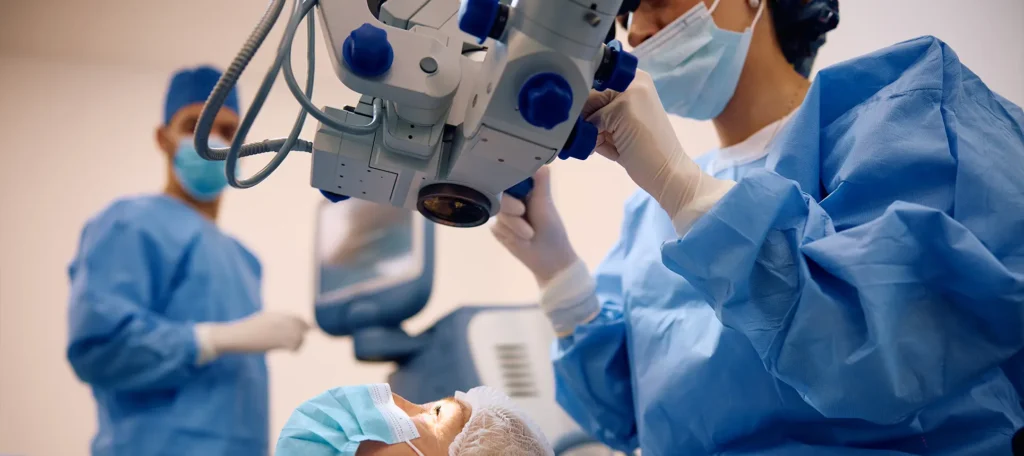When it comes to cataract surgery, the clinic you choose will shape not just your experience but the quality of your vision for the rest of your life. With so many private providers out there, it can be difficult to know where to begin. That’s where this checklist comes in. I’ve pulled together the key things to look for—so you can make a confident, well-informed decision. Let’s get into it.
1. Check the Surgeon’s Qualifications and Experience
The first thing you should do is verify the surgeon’s professional background. A qualified cataract surgeon in the UK should be registered with the General Medical Council (GMC) and listed on the Specialist Register for ophthalmology. This confirms they’ve completed the necessary specialist training and are licensed to practise in the UK. If the surgeon isn’t on this register, that’s a serious concern.
You should also look into their membership of professional bodies, such as the Royal College of Ophthalmologists and the European Society of Cataract and Refractive Surgeons (ESCRS). These organisations are not just badges of prestige—they require continued professional development and adherence to high standards. A reputable surgeon will often display these affiliations clearly on their website or CV.
Don’t be afraid to ask how many cataract procedures the surgeon performs annually. Ideally, you want someone who carries out this type of surgery regularly—several hundred times a year is a good benchmark. Experience matters, especially when complications arise or if you have specific eye health concerns like high astigmatism or previous eye surgeries.
If you’re met with resistance when asking about qualifications or if you can’t verify credentials through official sources, it’s best to look elsewhere. Trust and transparency should be foundational. A truly reputable clinic will not only share this information but encourage you to check for yourself.

2. Review the Clinic’s CQC Assessment
Every private clinic offering medical services in England must be registered with the Care Quality Commission (CQC). This independent body inspects healthcare facilities and publishes detailed reports on their safety, effectiveness, care, responsiveness, and leadership. A clinic’s CQC rating can tell you a great deal about its overall standard of service.
You can easily search for a clinic’s CQC report on the website by typing in the clinic name or postcode. The report often includes observations about cleanliness, infection control, patient experience, and how well-trained the staff are. Don’t just skim the rating—read the full inspection report if you have time. It can offer insights that don’t make it into marketing brochures.
A rating of “Good” or “Outstanding” is reassuring, but it’s just as important to look at whether any recommendations for improvement have been made. If the report flags issues such as poor record-keeping or inadequate safety protocols, you might want to reconsider. Similarly, if a clinic has never been inspected or doesn’t show up in the database, that’s a warning sign.
Remember, even prestigious clinics can fall short on the operational side. CQC assessments help bridge the gap between glossy branding and the reality of what’s happening behind the scenes. They’re an objective measure—and a powerful tool in your decision-making process.
3. Find Out What Types of Lenses They Offer
Choosing the right intraocular lens (IOL) is just as important as selecting the right clinic. A good clinic will offer you a thorough lens assessment and talk you through your choices. These typically include monofocal lenses (standard NHS option), multifocal lenses (which can reduce dependency on glasses), toric lenses (for astigmatism), and extended depth of focus (EDOF) lenses that give smoother vision across ranges.
A high-quality clinic won’t push you towards one lens type without explanation. Instead, they’ll consider your lifestyle—whether you read a lot, drive at night, or spend time on screens—and tailor recommendations accordingly. Some people are happy with monofocal lenses and glasses for reading, while others want full visual freedom. The key is choice, not a one-size-fits-all package.
It’s also worth asking how lens selection is decided. Are they using advanced diagnostics like optical biometry and corneal topography to ensure precision? Do they explain the potential trade-offs of each lens type, such as glare with multifocals or reduced contrast with some EDOF lenses? An informed discussion shows the clinic values your vision and individual needs.
If the clinic only offers monofocal lenses, or if lens upgrades are pitched aggressively without clinical justification, be cautious. You want a clinic that matches the right lens to the right patient—not one that upsells based on profit.
4. Ask About the Technology and Facilities
A reputable cataract surgery clinic should be equipped with modern, well-maintained technology. This includes diagnostic tools like optical coherence tomography (OCT) and IOL Master or Lenstar for measuring your eye before surgery. Some clinics also offer femtosecond laser-assisted cataract surgery (FLACS) for greater precision during certain steps of the procedure.
That said, newer isn’t always better for everyone. Laser-assisted surgery may not be necessary for every case, and not all patients are suitable candidates. A good clinic will explain the benefits and limitations of the technology they use, rather than overselling the flashiest option.
You should also assess the cleanliness and organisation of the facilities during your initial visit. Operating theatres should follow strict infection control protocols, and recovery rooms should feel calm, clean, and comfortable. Ask when their equipment was last serviced and how often safety checks are done—clinics that are confident in their systems will answer these questions easily.
Technology should support clinical judgment, not replace it. The best outcomes come when modern tools are used by experienced, well-trained staff who understand their purpose and limitations.
5. Be Clear on the Full Costs (No Hidden Fees)
Private cataract surgery is an investment, and you should know exactly what you’re paying for. Look for clinics that offer transparent, itemised pricing that includes the pre-operative assessment, surgeon’s fees, anaesthetist costs, operating theatre time, the lens itself, and any follow-up appointments. Ambiguity is a red flag.
Some clinics advertise low entry prices, only to add costs for “premium lenses”, imaging tests, or even local anaesthetic. Others may charge extra for bilateral surgery (if you’re having both eyes treated), or enhancements post-surgery if your vision doesn’t reach the target. These details should be clarified before you sign anything.

A trustworthy clinic will give you a written quote and won’t pressure you into deciding on the spot. They’ll make it clear what is and isn’t included, and they’ll give you time to digest the information. Ask also about cancellation policies, refunds, and whether enhancements are included if the initial result isn’t quite right.
Choosing a clinic based on price alone can backfire. Remember: this isn’t like buying a new pair of glasses—this is a once-in-a-lifetime operation for most people. It’s worth prioritising clarity, quality, and consistency over saving a few hundred pounds.
6. Read Real Patient Reviews and Testimonials
Reviews can be revealing—if you know what to look for. While five-star ratings might seem reassuring, it’s the detail in the reviews that really matters. Look for stories where people describe the whole journey, from first contact through to follow-up. Did the staff make them feel at ease? Were complications handled well? Was the vision outcome as expected?
Be wary of overly generic testimonials that simply say things like “excellent service” or “very professional” without any detail. Also, check for patterns in negative reviews—if several people mention the same issue, such as poor communication or hidden charges, it’s worth paying attention. Reputable clinics may not have perfect ratings, but they should be responsive and willing to learn from feedback.

You can find patient reviews on Google, Trustpilot, and sometimes on Doctify, which specialises in healthcare provider feedback. It’s also worth visiting relevant forums like Patient.info or condition-specific Facebook groups, where people share honest experiences and aren’t shy about naming names.
Finally, don’t hesitate to ask the clinic if you can speak to a previous patient. Many clinics have former clients who are happy to share their stories and give you a more personal insight into what to expect.
7. Ask What Happens If Something Goes Wrong
Even though cataract surgery has an excellent safety record, complications—though rare—can happen. That’s why it’s so important to ask what support is available if things don’t go exactly to plan. Reputable clinics have clear aftercare processes in place, including emergency contacts and follow-up appointments to monitor healing.
You should ask whether the clinic includes enhancement procedures if the initial surgery doesn’t produce the expected result. For example, you might need a YAG laser capsulotomy if the capsule behind your lens becomes cloudy—a common occurrence. A good clinic will explain this upfront and let you know if there are any additional charges for such procedures.
It’s also worth checking whether the clinic has indemnity insurance in place and what their policy is on revision surgery. Will they re-operate free of charge if your vision doesn’t meet the target? Will you have continued access to the surgeon who performed the operation? Continuity of care is often overlooked, but it’s crucial when things don’t go perfectly.
If the clinic brushes off your concerns, avoids the topic of risks, or gives vague answers about what they’ll do in the event of complications—that’s a serious red flag. You want honesty, not empty reassurances.
8. Gauge the Communication and Patient Care
The way you’re treated before surgery is often a sign of how things will go after surgery too. During your initial consultation, you should feel listened to—not talked at. The clinic staff should take time to explain the procedure, risks, benefits, lens choices, and what recovery looks like, all in plain language.
Take note of whether the clinic offers a dedicated point of contact throughout your treatment journey. Some clinics have care coordinators or patient advisors who guide you through every step, answering questions and making sure you feel supported. Others leave you to navigate things alone, which can be unsettling—especially if it’s your first eye procedure.
You should never feel rushed into a decision. If you’re encouraged to book surgery before you’ve had time to process the information, consider that a red flag. A good clinic wants informed patients who feel confident in their choices, not pressured ones chasing a discount deadline.
Remember, you’re not just buying a service—you’re building a relationship with a healthcare provider. The trust you feel in those early conversations often reflects the culture of the clinic itself.
9. Consider Location, Accessibility, and Practical Details
Don’t underestimate the value of convenience. You’ll need to attend pre-operative assessments, the surgery itself, and follow-up visits. If the clinic is far away or difficult to get to, this can add stress—especially if you rely on public transport or someone else to drive you.
It’s also worth asking how quickly the clinic can schedule your surgery after your initial consultation. Some providers can book you in within a few days, while others may have a longer wait time—especially for popular surgeons. Make sure their availability aligns with your own schedule and needs.

Check if the clinic offers services like free parking, wheelchair access, or assistance for patients with mobility or sensory needs. Some even offer transport for those coming from further afield. The level of attention they give to these small but important details says a lot about their overall approach to patient care.
Also ask about clinic hours. Do they offer weekend or evening appointments? This flexibility can make a big difference if you’re juggling other responsibilities like work or caregiving.
10. Ask About Follow-Up and Long-Term Monitoring
Surgery is just one part of your journey. What happens afterwards is just as important. A good clinic won’t just wave you out the door after the operation—they’ll schedule follow-up visits to check healing, monitor your visual outcome, and deal with any unexpected issues.
Typically, you should expect at least two post-operative appointments: one within the first week, and another around four to six weeks after surgery. These checks allow the surgeon to ensure your eye pressure is normal, your new lens is well-positioned, and your vision is settling as planned.
If your vision doesn’t improve as expected, or if complications arise (such as inflammation or lens movement), you want to be sure you’ll get prompt attention. Ask if you’ll be seeing the same surgeon for follow-up, or if you’ll be passed to a different team. Continuity really does matter.
Finally, ask what long-term support is available. Some clinics offer annual eye health check-ups, or discounts for future procedures like YAG laser treatment or surgery on your other eye. Knowing this in advance helps you plan with peace of mind.
Final Thoughts
Choosing a cataract surgery clinic is a big decision—but it doesn’t have to be overwhelming. With this checklist in hand, you can approach it methodically and confidently. It’s not about picking the flashiest clinic or the cheapest quote—it’s about choosing the one that offers the right balance of safety, skill, and support.
Trust your instincts as much as the facts. If something feels off during your initial consultation, listen to that. A truly excellent clinic won’t just treat your eyes—they’ll treat you with respect, transparency, and care from beginning to end.
And remember: it’s perfectly fine to visit more than one clinic before deciding. Comparing experiences can give you clarity and help you spot who’s genuinely offering the best care—not just the best sales pitch.
You deserve to see clearly, and to feel confident about the hands that will help you get there. Take your time. Ask questions. And make the choice that’s right for you. If you’re considering private cataract surgery and want expert, personalised advice, feel free to get in touch with us at the London Cataract Centre to arrange a consultation.

